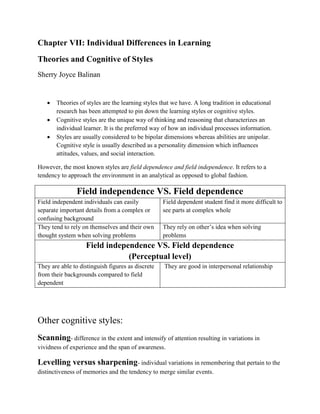2. theoriesof styles 3. cognitive styles sherry joyce balinan
•Download as DOCX, PDF•
0 likes•720 views
Report
Share
Report
Share

Recommended
More Related Content
What's hot
What's hot (20)
Educational implications of individual differences among students and

Educational implications of individual differences among students and
[Facilitating Learning] Constructivism: Knowledge Construction/Concept Learning![[Facilitating Learning] Constructivism: Knowledge Construction/Concept Learning](data:image/gif;base64,R0lGODlhAQABAIAAAAAAAP///yH5BAEAAAAALAAAAAABAAEAAAIBRAA7)
![[Facilitating Learning] Constructivism: Knowledge Construction/Concept Learning](data:image/gif;base64,R0lGODlhAQABAIAAAAAAAP///yH5BAEAAAAALAAAAAABAAEAAAIBRAA7)
[Facilitating Learning] Constructivism: Knowledge Construction/Concept Learning
Theories and models of learning instruction revised

Theories and models of learning instruction revised
Similar to 2. theoriesof styles 3. cognitive styles sherry joyce balinan
Similar to 2. theoriesof styles 3. cognitive styles sherry joyce balinan (20)
Cognitive Development of the High School Learners - Psychology 2

Cognitive Development of the High School Learners - Psychology 2
Learning/Thinking Styles and Multiple Intelligences

Learning/Thinking Styles and Multiple Intelligences
Learner: Definition and theories of learning, Student’s Learning Style, and T...

Learner: Definition and theories of learning, Student’s Learning Style, and T...
Attitudes evaluating and responding to the social world - Analysis

Attitudes evaluating and responding to the social world - Analysis
Comparison of behavioural%2c cognitive and social cognitive approaches to lea...

Comparison of behavioural%2c cognitive and social cognitive approaches to lea...
More from AhL'Dn Daliva
More from AhL'Dn Daliva (20)
Motivational & emotional influences of learning alladin daliva

Motivational & emotional influences of learning alladin daliva
Managing the physical environment of a classroom alladin daliva

Managing the physical environment of a classroom alladin daliva
1. nature of learning 2.theories of learning rizabel salvatierra

1. nature of learning 2.theories of learning rizabel salvatierra
3. behavioral theory of learning 4. cognitive theoties of learning mirasol ...

3. behavioral theory of learning 4. cognitive theoties of learning mirasol ...
5. constructivist learning theories 6. constructivist teaching principles m...

5. constructivist learning theories 6. constructivist teaching principles m...
7. knowledge acquisition, representation and organization 8. semantic network...

7. knowledge acquisition, representation and organization 8. semantic network...
1. cognitive and metacognitive factors of learning 2. developing metacognitio...

1. cognitive and metacognitive factors of learning 2. developing metacognitio...
5. distinction of cognitive & metacognitive learning strategies 6. establishi...

5. distinction of cognitive & metacognitive learning strategies 6. establishi...
2. theoriesof styles 3. cognitive styles sherry joyce balinan
- 1. Chapter VII: Individual Differences in Learning Theories and Cognitive of Styles Sherry Joyce Balinan Theories of styles are the learning styles that we have. A long tradition in educational research has been attempted to pin down the learning styles or cognitive styles. Cognitive styles are the unique way of thinking and reasoning that characterizes an individual learner. It is the preferred way of how an individual processes information. Styles are usually considered to be bipolar dimensions whereas abilities are unipolar. Cognitive style is usually described as a personality dimension which influences attitudes, values, and social interaction. However, the most known styles are field dependence and field independence. It refers to a tendency to approach the environment in an analytical as opposed to global fashion. Field independence VS. Field dependence Field independent individuals can easily separate important details from a complex or confusing background Field dependent student find it more difficult to see parts at complex whole They tend to rely on themselves and their own thought system when solving problems They rely on other’s idea when solving problems Field independence VS. Field dependence (Perceptual level) They are able to distinguish figures as discrete from their backgrounds compared to field dependent They are good in interpersonal relationship Other cognitive styles: Scanning- difference in the extent and intensify of attention resulting in variations in vividness of experience and the span of awareness. Levelling versus sharpening- individual variations in remembering that pertain to the distinctiveness of memories and the tendency to merge similar events.
- 2. Reflection versus impulsivity- individual consistencies in the speed and adequacy with which alternative hypotheses are formed and responses made. Conceptual differentiation- differences in the tendency to categorize perceived similarities among stimuli in terms of separate concepts or dimensions.
